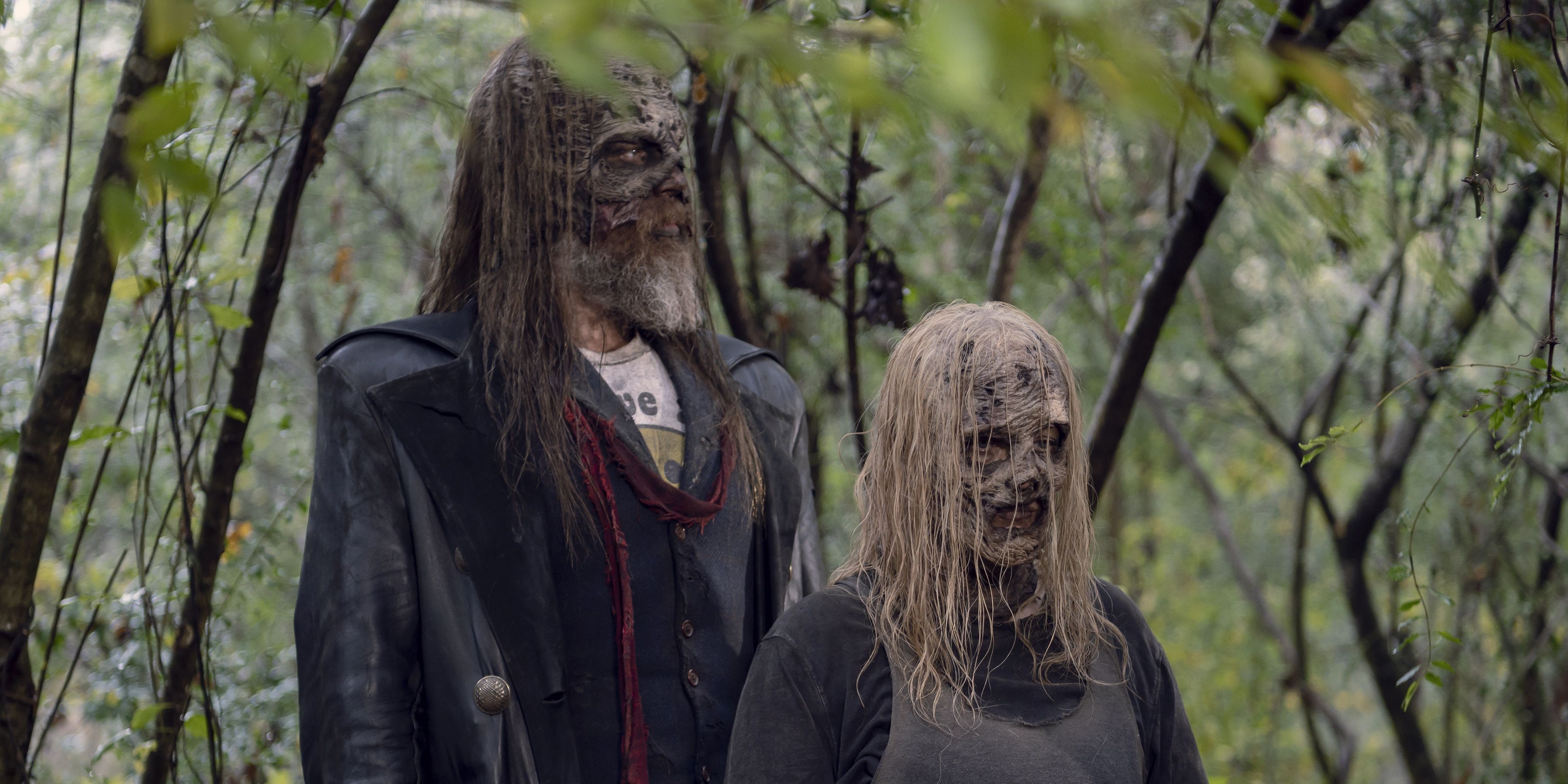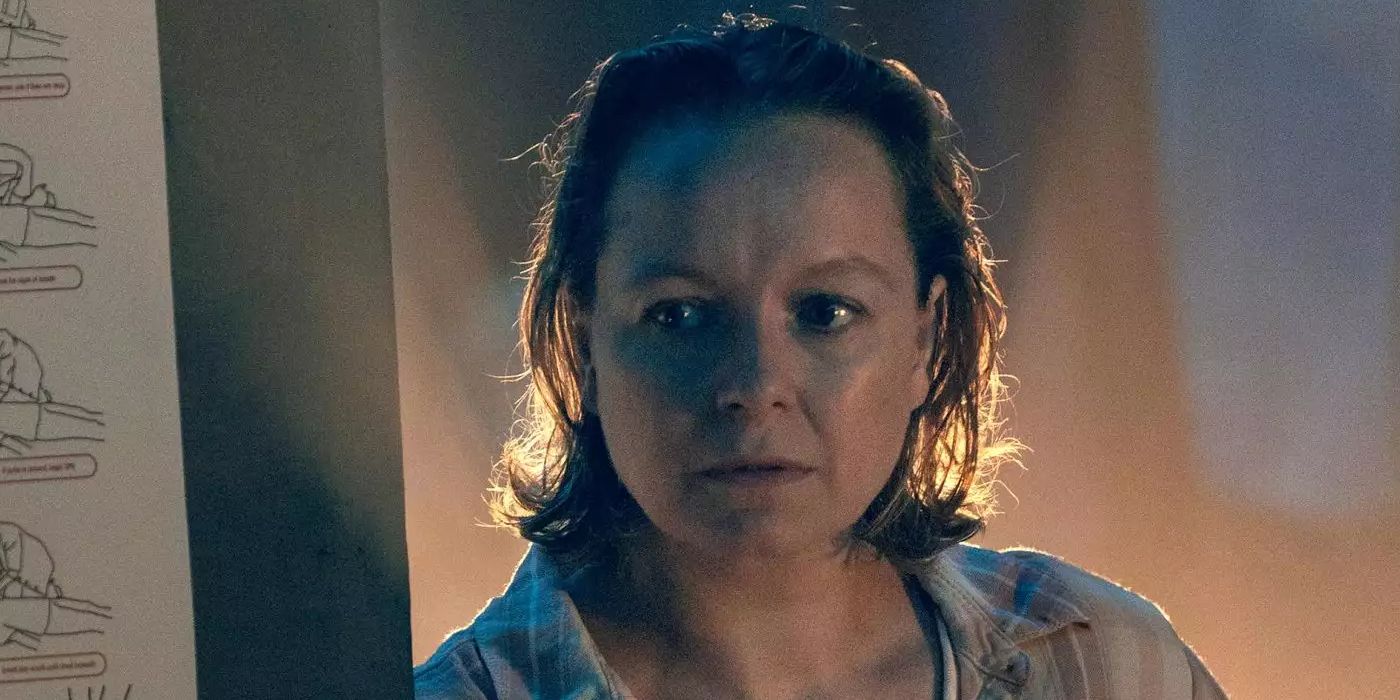Our belief in The Walking Dead has been reinstated by the enjoyably grim The Walking Dead: Dead City spin-off. One of the best things about Maggie (Lauren Cohan) and Negan’s (Jeffrey Dean Morgan) New York City rescue mission is the latest addition to the expanded universe: Zeljko Ivanek’s villain The Croat, a man possessed of a calm and calculated evil. A tighter focus and better character development have reminded fans that The Walking Dead is only as good (or as bad) as its Big Bad.
There has been no shortage of captivating villains instilling fear and terror in the world of The Walking Dead, from devil-with-a-handsome-face The Governor (David Morrissey) to Terminus cannibal leader Gareth (Andrew J. West) to Negan and his crew of psychopathic douche bags, The Saviors. But one villain frequently overlooked by The Walking Dead fan base was the memorably barbaric Alpha (Samantha Morton), the bald, walker-skin wearing psychotic leader of The Whisperers. Considered the primary villains of the series, The Governor and Negan enjoyed spin-off books, comics, and now a TV show with Jeffrey Dean Morgan as the lead. Alpha hasn’t enjoyed the same kind of recognition as her predecessors. The leader of a zombie-skin-wearing cult is the most chilling villain in The Walking Dead’s history for several reasons.
‘The Walking Dead’ Gave a Twisted Logic To Alpha’s Philosophy
Robert Kirkman created Alpha in the source material as an equal to top-tier villains Negan and The Governor and by introducing Alpha and her army of Whisperers, he introduced a very different kind of enemy. A cult of people who had made a conscious decision to not only mimic walkers, but wear their skin and live among them. At first glance, it might seem like an insane choice, but there is a logic to Alpha’s decision to navigate the world of the dead. In the Tales of the Walking Dead episode, “Dee,” we meet the woman who would become Alpha in the early years of the outbreak. We discover Dee aka Alpha didn’t form The Whisperers or create their customs, it was a woman called Hera who preceded her. It is likely Hera was a more benevolent leader than Alpha — after all, she did intervene and prevent Dee from killing Lydia, something Alpha would never do. At some point, Dee fought and usurped Hera as leader. Samantha Morton played an early version of the character with insecurity and a lack of confidence she didn’t have in The Walking Dead, and it accentuated the parameters of the character in a new way. The writers/actress never betrayed the character despite revisiting her after her exit from the main show. It was the strongest installment of Tales and slowly peeled away Dee’s layers in a straightforward and solid episode. They really captured the human element of Dee pre-Alpha.
Another thing perfectly clear from Alpha’s first appearance was her disregard and animosity toward other people and her ruthless methods when anyone tries to cross her, or even disagree with her. The Governor at least pretended to care and initially provided a safe space for survivors and Negan may have been ruthless, but he wasn’t entirely divorced from his humanity. Alpha and her followers willingly submit to their violent and base nature, shunning the possibility of shelter, safety, and community.
Samantha Morton Was The Perfect Alpha In ‘The Walking Dead’
Casting UK actress Samantha Morton as a cult leader was ingenious. Morton was no stranger to playing certifiable psychopaths; she’d played the title role in Lynne Ramsey‘s 2002 Morvern Callar and started her career playing Tracey in the controversial Band of Gold alongside Lena Headey. Her genre credits prior to The Walking Dead include Minority Report and Victorian romp Harlots. Morton had a reputation for playing offbeat, difficult characters in TV and movies, and she really made the role of Alpha her own, conveying a menace and inner conflict with the murderous character. She brought a humanity to a woman who had decided to relinquish her own morality in a pursuit of dominance and control. Alpha was maybe one of the most outlandish characters in the source material, so her transition to the screen was never going to be easy.
Morton’s performance grounded the character and gave her relatable dimensions with the relationship she had with daughter Lydia (Cassady McClincy), her second-in-command Beta (Ryan Hurst) and later in her strange alliance with former villain Negan. Exploring her background in Tales gave us a nearly unrecognizable character, demonstrating how she wasn’t always crazy with bloodlust and relied entirely on her connection to Lydia for emotional support. It offered another insight watching how she interacted and was treated by other people during her time on the barge. Her villainous trajectory made more sense.
The Walking Dead’s expanded universe is arguably, a mixed bag. The Walking Dead: Dead City promises to restore the universe to greatness with its current batch of super-dark episodes and returning it to a tight focus and a smaller ensemble is reminiscent of The Walking Dead at its best. Fans finally have hope for the forthcoming The Walking Dead: Daryl Dixon and The Walking Dead: Rick and Michonne spin-offs. But will we get another iconic villain like Alpha? Unlikely, but fingers crossed.
Stay connected with us on social media platform for instant update click here to join our Twitter, & Facebook
We are now on Telegram. Click here to join our channel (@TechiUpdate) and stay updated with the latest Technology headlines.
For all the latest TV News Click Here


